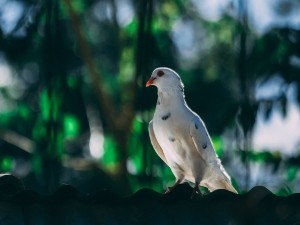
Every plant and animal plays some part in the environment, so what do pigeons do for the environment?
Pigeons play a vital role in the environment, they serve as food for peregrine falcons, hawks, foxes and martins. They also maintain and regulate insect species in an environment as well as weeds such as thistles. These birds also play a part in seed dispersal by eating seeds and distributing them.
Pigeons don’t have the best reputation, they are known by many as flying rats, they eat pretty much any food we throw at them, they poop all over the place and many see them as filthy.
But surely they were created for a purpose? So what do pigeons do for the environment? This article looks into it. Whether you’re a pigeon lover, pigeon hater or are simply curious this article is for you
Table of Contents
What do pigeons do for the environment?
One of the reasons why pigeons exist is to be a food source to a number of prey birds like hawks and peregrine falcons.
This is the case in countries like Poland, Southwest England, Brazil, Argentina and Patagonia. Pigeons also serve as a source of prey to peregrines in New York and Arizona in America.
In addition to being a food source to birds of prey, they are also a food source for animals like martins and foxes.
Also, pigeons help regulate insect populations as they are omnivores eating both plant and animal matter.
Pigeons also play a part in seed dispersal, they eat both plants and animals thus pigeons wind up eating the seeds of plants as well.
When they pass faeces, at different locations, the seeds pass with the faeces. This is how seed dispersion happens. Also, their poop is a great fertilizer.
These feathered friends are one of natures weed killers. They eat thistles in large quantities. Ripping them out and eating them prevents them from overgrowing. This plant is a known noxious weed.
Pigeons eating them prevents overgrowth and prevents them from crowding other plants.
All species are needed in the environment, each plays its own role. If the pigeon species disappears or collapses, then the whole web of life becomes off-balance and can collapse.
FAQ:
Why did we stop keeping pigeons?
We stopped keeping pigeons for a variety of reasons, reasons such as: we learnt that they carried dieases so we started to see them as vermin, we didn’t need them to carry messages anymore, because of technology, and we stopped using their poop as fertaliser.
How do pigeons show love?
Pigeons will treat us like a member of their flock to show love; they will gently peck on your face, cuddle up to you, and the bird will try to preen your hair to show affection
What are the dangers of pigeons in the environment?
Although pigeons are great for the environment, they are not always the best to have around your home and other human environments.
They have adjusted to living with humans and nesting inside or outside buildings, but they can cause damage.
The main byproducts of pigeons that you should be worried about are the pigeons’ droppings.
The droppings are highly acidic, can cause illness in humans, and are very unsightly. The poop can wear down masonry and cause soft stone to deteriorate.
The droppings can also affect your building’s finishes.
The actual birds themselves can lift roof coverings, battens on your buildings and tiles to get into your roof in an effort to nest.
The feathers and any other materials that they use to create nests can result in blocked gutters.
The effect of this will include water penetration, which can, in turn, lead to the growth of wood-rotting fungi
Summary
In summary, pigeons play a vital role in the environment. They are a food source for birds of prey such as hawks and peregrine falcons. They also are a food source for foxes and martins.
In addition, pigeons also control insect populations as well as weed populations such as thistles which can become overgrown and crowd other plants.
Biodiversity is also pushed forward by these birds as they help with seed dispersal. That being said, they can also negatively affect your home by pooping on your property and lifting parts of your roof structure to nest
If you enjoyed this article then you may also be interested in other pigeon related articles. Here are some articles that you may be interested in: What do pigeons eat in summer? Why do pigeons attack humans? How do pigeons lay eggs? Why do pigeons make noise when they fly? What do carrier pigeons eat? How do pigeons communicate?

